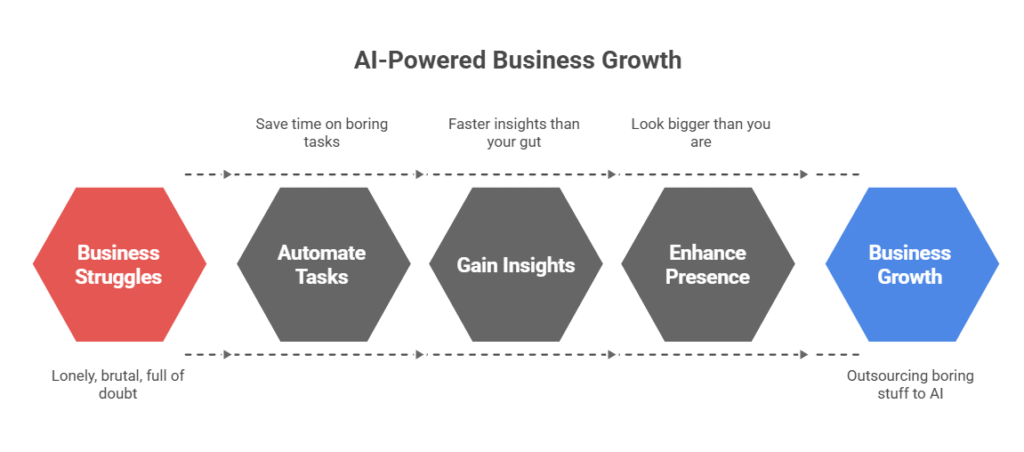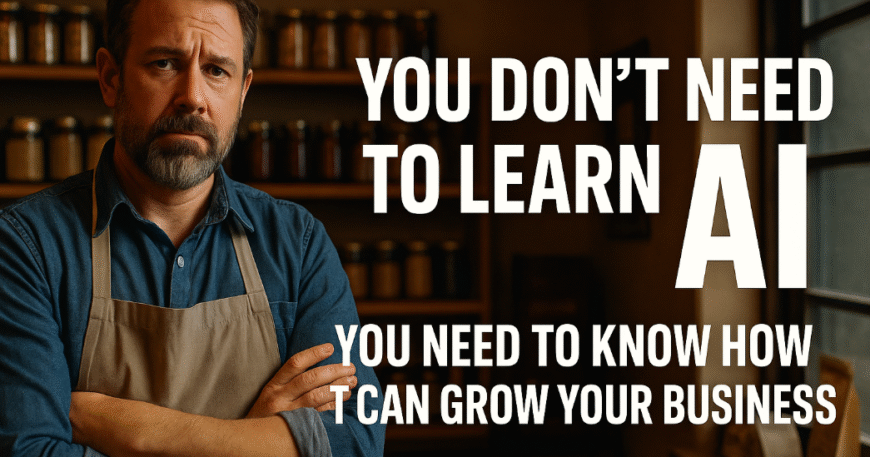Table of Contents
- The Real Pain No One Talks About
- The Corner Shop That Almost Died
- What AI Actually Does (Not What You Think)
- Stop Learning AI. Start Using It.
- 3 Low-Tech Ways AI Can Help You Grow
- Final Word: You’re Not Falling Behind—Unless You Ignore This
The Real Pain No One Talks About
Let’s keep it 100 for a second.
Starting a business in the U.S. is lonely, brutal, and full of self-doubt.
You’ve got bills piling up. You’re running ads that don’t work. You’re trying to manage your website, bookkeeping, customer DMs, AND make time to actually sell.
Everyone on LinkedIn is talking about AI like it’s the second coming, but all you want is to figure out how the hell to get 10 more customers this month without burning out.
Sound familiar?
You don’t need another masterclass on AI.
You don’t need to know how ChatGPT works under the hood.
You need to know how this stuff can help you survive—and then grow.
The Corner Shop That Almost Died
Meet Lisa.
She runs a small boutique skincare brand out of Denver. Handmade soaps, body oils, the works.
At first, she sold to friends and family. Then some locals.
But then? Crickets.
She did what every other scrappy founder does:
- Posted daily on Instagram.
- Paid for a fancy Shopify theme.
- Tried boosting a few posts.
And guess what? She burned through $1,700 and made 5 sales.
It was frustrating. And the worst part?
Everyone kept saying “You need to get into AI!”
But no one told her what that actually meant.
One day she tried using ChatGPT to write her email campaigns (because writing was eating her time).
Boom. She saved 10 hours that week.
Next, she used a free AI tool to analyze her customer reviews and discovered that people loved her lavender soap because it helped with sleep.
She created a “Sleep Kit” bundle, used ChatGPT to write the landing page—and sold out in 4 days.
That’s it.
No coding. No AI degrees. Just real problems, solved by real tools.

What AI Actually Does (Not What You Think)
Let’s demystify this beast.
AI isn’t some magic box that “replaces” people. It just:
- Saves you time on boring tasks.
- Gives you insights faster than your gut can.
- Makes you look bigger than you actually are.
Think of AI like hiring a $1/hour intern who works 24/7, never sleeps, and is weirdly good at writing, analyzing, and suggesting stuff.
That’s it. That’s the metaphor.
It’s not about becoming a tech genius. It’s about being resourceful.
Stop Learning AI. Start Using It.
Most small business owners are consuming content instead of taking action.
You’re watching reels about AI tools, but you haven’t opened a single one.
Start with your biggest time suck.
Is it:
- Writing content?
- Handling customer service?
- Analyzing what’s working in your marketing?
Whatever it is, there’s likely an AI tool that can help with that.
Not 50 tools. Just one.
Let AI help you with the thing that’s draining you the most.
Not because it’s cool—but because it gets you your life back.
Low-Tech Ways AI Can Help You Grow
You don’t need a PhD or a full-stack developer.
Here are three AI use cases even your grandma can pull off:
1. Instant Copywriting Assistant (Email, Ads, Blogs)
Use ChatGPT to write your:
- Email campaigns
- Product descriptions
- Social media captions
Just say:
“Write a fun, friendly email promoting my handmade lavender soap that helps people sleep.”
It’ll give you 80% of what you need. Edit the rest.
2. Customer Review Analyzer
Use free AI tools like MonkeyLearn or ChatGPT to analyze customer feedback.
Paste in your reviews and ask:
“What do customers like most? What words do they keep using?”
You’ll get insight into what messaging to double down on in your marketing.
3. Create Personalized Video Scripts
Want to feel like a big brand with $0?
Use ChatGPT to write short 60-second product explainer scripts.
Then record them on your phone.
Use free tools like Descript to edit like a pro.
Suddenly, you’re a media company. No team required.
Final Word: You’re Not Falling Behind—Unless You Ignore This
AI isn’t a trend. It’s a tool.
You don’t need to learn it. You just need to leverage it.
And in a world where your competitors are barely keeping up, using AI—even a little—gives you an edge.
The difference between a business that grows and one that grinds to death in 2025?
One outsources the boring stuff to AI.
The other stays buried in it.
Which one will you be?




